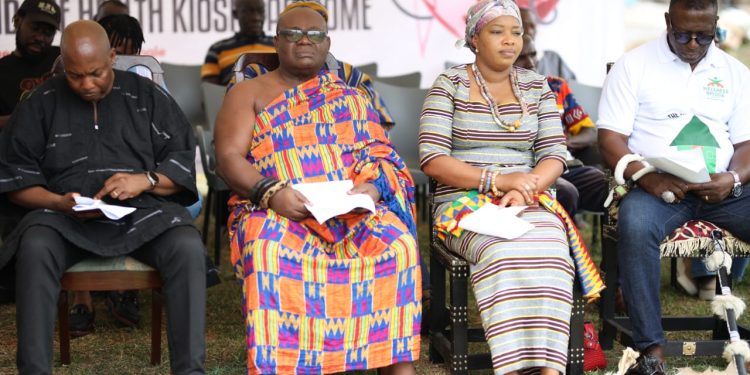The fight against non-communicable diseases (NCDs) such as hypertension and diabetes has taken a new community-driven dimension in Ghana, with the launch of the Health Kiosk Initiative by the Wellness Bridge Initiative (WBI) in Adidome in the Central Tongu District of the Volta Region.
The project seeks to prevent avoidable deaths, reduce the burden on hospitals, and promote healthier lifestyles across the country.
Non-communicable diseases, often described as “silent killers,” remain among the leading causes of hospital admissions and premature deaths in Ghana.
Many victims live with undiagnosed conditions until they result in fatal complications.
By making preventive care accessible at the community level, the Health Kiosk Project aims to change this grim reality.
A candle of hope for communities
Launching the initiative, Togbe Kwasinyi Kakaklolo Agyeman V, Executive Director of WBI and Chief of Adidome, described the Health Kiosk as “a candle of hope” that will light the path toward better health outcomes for his people.
He explained that the project would begin in Adidome but would soon be scaled up to cover all five sub-districts of the Central Tongu Health Directorate, before being extended to other parts of Ghana.
“The Health Kiosk Project is designed to offer preventive health solutions to the people. Our aim is to start small but grow to serve the entire nation,” he stressed.
The urgent need for preventive action
According to a Johns Hopkins Nursing publication, hypertension tops all adult hospital admissions in Ghana and is responsible for a significant proportion of hospital deaths.
This has made it one of the most urgent health challenges facing the country.
Togbe Agyeman lamented the rising number of deaths and disabilities caused by hypertension and diabetes, particularly among the younger generation.
He drew attention to the growing trend of premature deaths reflected on funeral posters, which often bear stark messages such as “Gone Too Soon” and “Painful Exit.”
“These deaths are preventable. We must take action before it is too late,” he urged.
Building on 4 strategic pillars
The Health Kiosk Initiative is anchored on four strategic pillars of WBI, collectively known as ACNE:
Awareness
Health education campaigns to increase community knowledge of NCDs.
Checking
Free screenings for blood pressure and blood sugar, with referrals for further care.
Nutrition
Promoting healthy eating habits through the campaign “We are what we eat,” with a focus on local foods.
Exercise
Encouraging physical activity across all age groups, with special attention to those aged 50 and above, under the program “Age is a Number.”
These pillars are expected to build a preventive health culture in communities and significantly cut down on the prevalence of NCDs.
Partnerships for sustainable health
The project is being rolled out in close collaboration with the Central Tongu District Directorate of the Ghana Health Service (GHS), which will supervise and train kiosk attendants.
The kiosks will serve as first points of screening, referring patients at risk to the Adidome District Hospital for proper diagnosis and treatment.
Togbe Agyeman expressed gratitude to the Mafi Adidome Development Advisory Board (MADAB) and individual donors who helped fund the first kiosk, while calling for broader support from government, international donors, corporate bodies, and philanthropists to sustain and expand the initiative.

“This project is directly tied to the United Nations Sustainable Development Goal 3 (SDG3), which seeks to ensure healthy lives and promote well-being for all at all ages. We have the vision and the plan. What we now seek is the fuel to expand, operate sustainably, and reach every corner of Ghana and beyond,” he said.
Positive impact on national health
If fully scaled up, the Health Kiosk Initiative has the potential to deliver far-reaching benefits
These include reducing premature deaths by detecting NCDs early and preventing complications, relieving hospitals of pressure, as more cases will be managed through early interventions promoting lifestyle changes, with better diets and increased physical activity and raising health awareness, helping communities take responsibility for their wellness.
By tackling preventable conditions at the grassroots, the project could transform Ghana’s public health landscape, especially in rural and peri-urban areas where access to preventive care is often limited.
Leaders endorse the initiative
The launch was chaired by Dr. Elikplim Kwabla Apetorgbor, Commissioner and Volta Representative to the National Development Planning Commission (NDPC), who hailed the Health Kiosk as a shining example of innovative leadership.
“If there was any award today in recognition for traditional innovation, I would ask everyone to vote for Togbe Kwasinyi Kakaklolo Agyeman V,” Dr. Apetorgbor said.
Other dignitaries present included the District Chief Executive of Central Tongu, Adison Dodzie Mornyuie; the District Health Director, Mr. Baba Awuni; chiefs and queenmothers, including the Queenmother of Adidome, Mama Drapey; as well as community leaders, the media, and residents.
Towards a healthier future
The Wellness Bridge Initiative’s Health Kiosk Project represents a bold step towards reshaping community health in Ghana.
By focusing on awareness, early detection, and lifestyle interventions, the initiative directly addresses the root causes of preventable diseases that continue to claim lives.
As Adidome embraces this pilot project, the hope is that the model will spread across the nation, helping to curb the silent epidemic of NCDs and ensuring that more Ghanaians live fuller, longer, and healthier lives.











